Expert’s Terms
One of the most important aspects of an Expert Witness’ work is getting paid!
Unfortunately, getting paid can also often be the most difficult part of the Expert’s brief. In order to assist both Experts and those instructing them The Academy of Experts produces Model Terms of Engagement (see the Resource Centre for more variations).
These are a set of clear standard terms designed to protect both the Expert and the Expert’s clients.
Cost Estimates
In litigation conducted under the CPR in multi-track cases claimant solicitors must submit a costs budget with the court very early in the litigation process. This budget “must provide an estimate of the costs of the proposed expert evidence” (CPR 35.4(2)). Further details and the implications that this has for Experts are available below.
Contingency Fees
Although receiving payment for work performed is of vital importance to the Expert – all work must be carried out within the framework of the Expert’s duties. For Civil work in England and Wales this means adhering to the CPR which states that the Expert’s duty is to the court:
This duty overrides any obligation to the person from whom he has received instructions or from whom he is paid. (CPR 35.3 (2))
In order to help maintain the Expert’s independence the Academy’s Judicial Committee has issued guidelines regarding the use of Contingency Fees.
For full details of the guidance notes [click here].
The Model Terms of Engagement state clearly that payment may not be on a Contingent Basis referring specifically to the the guidance notes (Section 6.4).
Fees Guidance
In general (in the UK) there are no prescribed charging rates for Expert Witnesses for either Criminal or Civil work. The Academy is undertaking a Fees Survey (see below) in order to assess current practices among its members. The result of this survey will be available shortly.
The Legal Aid Agency provides guidance about Expert Witness in cases funded by legal aid including fees and provisions for specific types of Expert Witness.





